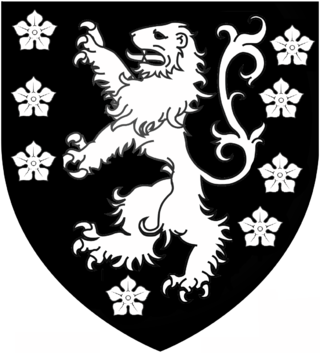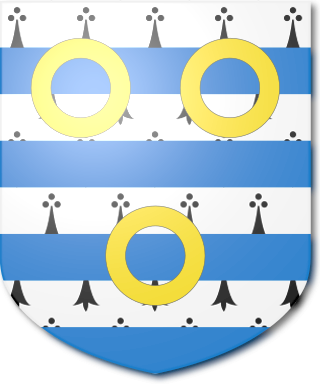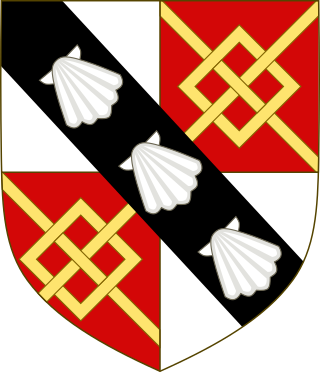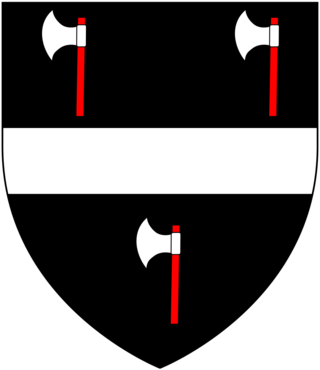Related Research Articles
George Goring, 1st Earl of Norwich was an English soldier and politician who sat in the House of Commons between 1621 and 1628 when he was raised to the peerage.

Sir Gilbert Pickering, 1st Baronet, 10 March 1611 to 17 October 1668, was a member of the landed gentry from Northamptonshire, and a religious Independent who supported Parliament in the Wars of the Three Kingdoms. An MP for Northamptonshire for most of the period from 1640 to 1660, during the 1649 to 1660 Interregnum he also served as Lord Chamberlain, sat on the English Council of State, and was appointed to Cromwell's Upper House in 1658.

Sir John St John, 1st Baronet of Lydiard Tregoze in the English county of Wiltshire, was a Member of Parliament and prominent Royalist during the English Civil War. He was created a baronet on 22 May 1611.
Sir Richard Onslow was an English politician who sat in the House of Commons at various times between 1628 and 1664. He fought on the Parliamentary side during the English Civil War. He was the grandson of one Speaker of the House of Commons and the grandfather of another, both also called Richard Onslow.

There have been three baronetcies, all in the Baronetage of England, created for members of the Spencer family, both for descendants of two younger sons of Sir John Spencer (1524–1586) of Althorp, Northamptonshire:

Sir Gervase Clifton, 1st Baronet, K.B. was an English politician who sat in the House of Commons at various times between 1614 and 1666. He supported the Royalist cause in the English Civil War. He was educated at St John's College, Cambridge.
Sir John Wray, 2nd Baronet was an English politician who sat in the House of Commons at various times between 1614 and 1648. He supported the Parliamentary cause in the English Civil War.

Sir John Cooper, 1st Baronet, 24 October 1597 to 23 March 1631, was a member of the landed gentry and MP for Poole from 1625 to 1629. He died of tuberculosis, leaving debts of over £40,000 and is best remembered for being the father of Anthony Ashley Cooper, 1st Earl of Shaftesbury.

Sir Thomas Harries or Harris, 1st Baronet was an English lawyer.
Sir William Lytton DL JP was an English politician who sat in the House of Commons from 1640 to 1648. He supported the Parliamentary cause in the English Civil War.
Sir Thomas Cheek, Cheeke or Cheke was an English politician who sat in the House of Commons in every parliament between 1614 and 1653.
The Nicolls Baronetcy, of Hardwick in the County of Northampton, was a title in the Baronetage of England. It was created on 28 July 1641 for Francis Nicolls, previously Member of Parliament for Bishop's Castle and Northamptonshire. The title became extinct on the death of the third Baronet in 1717.
Sir John Leigh (1598–1666) was an English politician who sat in the House of Commons at various times between 1640 and 1660.

Sir William Strode (1562–1637) of Newnham in the parish of Plympton St Mary, Devon, England, was a member of the Devon landed gentry, a military engineer and seven times a Member of Parliament elected for Devon in 1597 and 1624, for Plympton Erle in 1601, 1604, 1621 and 1625, and for Plymouth in 1614. He was High Sheriff of Devon from 1593 to 1594 and was knighted in 1598. In 1599 he was appointed Deputy Lieutenant of Devon. There is a monument to him in the parish church of Plympton St Mary.

Sir John Spencer was an English nobleman, politician, knight, sheriff, landowner, and Member of Parliament. He was an early member of the Spencer family.
Thomas Brudenell, 1st Earl of Cardigan, known as Sir Thomas Brudenell, Bt, between 1611 and 1628 and as The Lord Brudenell between 1628 and 1661, was an English peer and Royalist soldier.
Sir Augustine Nicolls or Nicholls (1559–1616) was an English judge.

Sir Chichester Wrey, 3rd Baronet (1628–1668) of Trebeigh in the parish of St Ive, Cornwall and of North Russell in the parish of Sourton, Devon, was an active Royalist during the Civil War and was Colonel of the Duke of York's Regiment and served as Governor of Sheerness.
Sir George Oughtred Courtenay, 1st Baronet, of Newcastle was an Irish landowner and soldier. He defended Limerick at the siege of 1642 during the Irish Rebellion of 1641.
Francis Nicolls may refer to:
References
- ↑ "NICOLLS (NICHOLS), Francis (1586-1642), of Faxton, Northants". History of Parliament Online. Retrieved 5 September 2016.